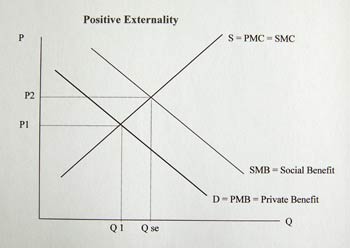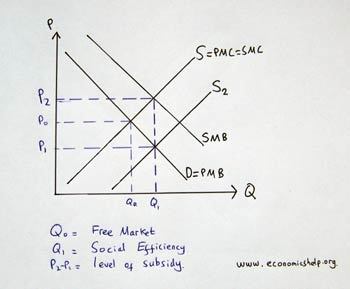Catalytic converters help reduce pollution and therefore have positive externalities. This means that if consumers use them there will be benefits to a third party, because there will be less pollution and health problems.
In a free market there may be under provision of catalytic converters, for various reasons. Firstly, because there are positive externalities Social Benefit will be greater than private benefit, but firms will ignore this.
Diagram for Positive Externality

In a free market the equilibrium output will be at Q1 where PMB = PMC.
However, social efficiency occurs at Q2 where SMC = SMB. Therefore, there is a case for subsidising firms to increase production and overcome market failure.
A subsidy of (P2 – P1) will shift supply to the right and increase demand to the socially efficient level.

Another argument for subsidising firms is that in a free market firms may find it difficult to get the necessary finance (money) to spend on research and development. This is because the benefits are in the future and may be uncertain, therefore, banks may be unwilling to lend money for risky investment.
Arguments against Subsidising Catalytic Convertors
However, there are problems with subsidising firms. Firstly giving them subsidises may encourage them to be inefficient. This is because the company has less need to cut costs because it can get money from the govt. This may not necessarily occur; it could depend on how competitive the industry was.
Subsidising firms will mean the govt will have to increase taxes; this could cause disincentives in the economy, because higher income taxes may reduce incentives to work. However, this problem could be overcome by taxing goods with negative externalities like petrol.
Another problem with govt intervention is that the govt may have poor information about how much to subsidise and who to give it to. Politicians are usually bad at making economic decisions, because they do not have economic pressure but political pressures.
A more significant problem is that demand for buses may be very inelastic. Buses only go certain routes therefore it is less suitable for some people, therefore making buses cheaper may not increase demand, it may be necessary to also increase the range of bus services and make them more attractive to consumers.
To conclude there is a good economic reason to subsidise firms producing catalytic converters but the govt will need to be careful that it gives the correct amount and that it is not wasted by companies.
